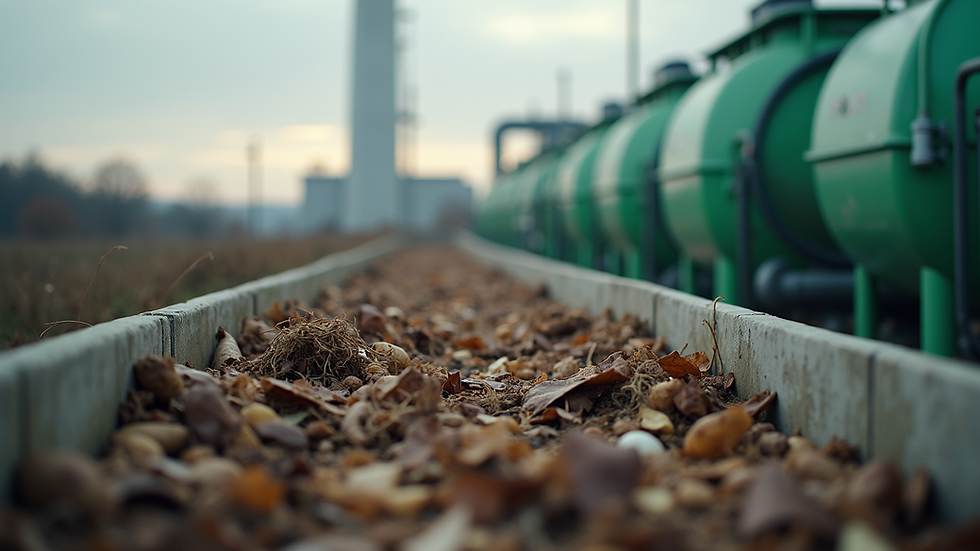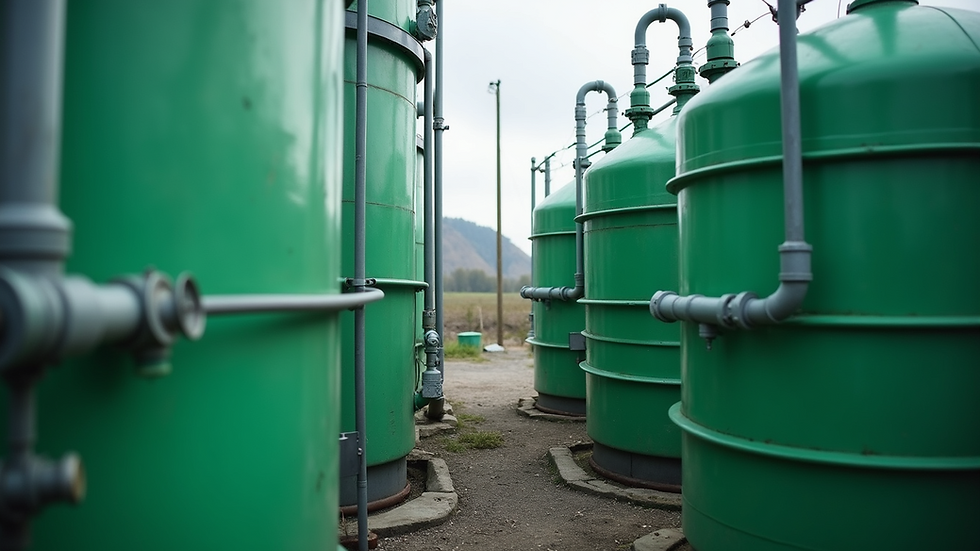Transforming Organic Waste into Clean Energy Solutions
- sid0194
- 4 days ago
- 4 min read
In a world where sustainability is becoming increasingly important, the need for innovative solutions to manage waste is more pressing than ever. One of the most promising avenues is the transformation of organic waste into clean energy. This process not only helps reduce the amount of waste sent to landfills but also provides a renewable source of energy.
In this blog post, we will explore how organic waste can be converted into clean energy, the technologies involved, and the benefits of this transformation. We will also look at real-world examples and discuss how individuals and communities can get involved.
Understanding Organic Waste
Organic waste refers to biodegradable materials that come from plants and animals. This includes food scraps, yard waste, and agricultural residues. According to the Food and Agriculture Organization (FAO), about one-third of all food produced globally is wasted. This waste not only contributes to greenhouse gas emissions when it decomposes in landfills but also represents a significant loss of resources.
By converting organic waste into energy, we can address two major issues: waste management and energy production.
The Process of Conversion
There are several methods to convert organic waste into clean energy. The most common methods include anaerobic digestion, composting, and gasification.
Anaerobic Digestion
Anaerobic digestion is a biological process that breaks down organic matter in the absence of oxygen. This process produces biogas, which is primarily composed of methane and carbon dioxide.
Key Steps in Anaerobic Digestion:
Collection: Organic waste is collected from various sources, such as households, restaurants, and farms.
Pre-treatment: The waste is often shredded or mixed to enhance the digestion process.
Digestion: The waste is placed in a digester, where microorganisms break it down, producing biogas.
Energy Production: The biogas can be used to generate electricity or heat, or it can be upgraded to biomethane for use as a vehicle fuel.
Composting
Composting is another method of converting organic waste into energy, although it primarily produces compost rather than energy. However, the compost can improve soil health, which indirectly supports energy production by enhancing agricultural yields.
Key Steps in Composting:
Collection: Organic waste is collected and sorted.
Layering: The waste is layered with carbon-rich materials, such as leaves or straw.
Decomposition: Microorganisms break down the organic matter over time, producing nutrient-rich compost.
Application: The compost can be used in gardens and farms, improving soil health and reducing the need for chemical fertilizers.
Gasification
Gasification is a thermal process that converts organic materials into syngas, a mixture of hydrogen and carbon monoxide. This syngas can be used to generate electricity or produce biofuels.
Key Steps in Gasification:
Feedstock Preparation: Organic waste is dried and shredded.
Gasification: The prepared waste is heated in a low-oxygen environment, producing syngas.
Energy Production: The syngas can be burned to generate electricity or further processed into fuels.
Benefits of Transforming Organic Waste
Transforming organic waste into clean energy offers numerous benefits, including:
Waste Reduction: Diverting organic waste from landfills reduces the volume of waste and the associated greenhouse gas emissions.
Renewable Energy: Organic waste is a renewable resource, providing a sustainable energy source.
Soil Health: Composting improves soil quality, which can enhance agricultural productivity.
Economic Opportunities: The development of waste-to-energy facilities can create jobs and stimulate local economies.
Real-World Examples
Several cities and organizations around the world are successfully implementing organic waste-to-energy programs.
San Francisco, California
San Francisco has a comprehensive organic waste collection program that includes food scraps and yard waste. The city uses anaerobic digestion to convert this waste into biogas, which is then used to generate electricity. This program has significantly reduced the amount of waste sent to landfills.
Sweden
Sweden is a leader in waste management and energy production from organic waste. The country has implemented a nationwide system for collecting organic waste, which is processed in anaerobic digesters. The biogas produced is used to power vehicles and generate electricity, making Sweden one of the most sustainable countries in the world.
The Netherlands
In the Netherlands, many farms are using anaerobic digestion to convert manure and crop residues into biogas. This not only provides a renewable energy source for the farms but also helps manage waste effectively.
Getting Involved
Individuals and communities can play a significant role in transforming organic waste into clean energy. Here are some practical steps to consider:
Start Composting: Begin composting at home to reduce food waste and create nutrient-rich compost for your garden.
Support Local Initiatives: Get involved with local programs that focus on organic waste collection and energy production.
Educate Others: Share information about the benefits of converting organic waste into energy with friends and family.
Advocate for Policy Changes: Support policies that promote waste-to-energy initiatives in your community.
The Future of Organic Waste and Energy
As the world continues to grapple with climate change and resource depletion, the transformation of organic waste into clean energy will become increasingly important. Advances in technology and growing awareness of sustainability will drive this movement forward.
By embracing these solutions, we can create a cleaner, more sustainable future. The potential for organic waste to provide energy is vast, and with collective effort, we can harness this resource for the benefit of our planet.

In summary, transforming organic waste into clean energy is not just a trend; it is a necessary step toward a sustainable future. By understanding the processes involved and the benefits they offer, we can all contribute to a cleaner environment and a more sustainable energy landscape. Together, we can turn waste into a valuable resource, paving the way for a greener tomorrow.


Comments